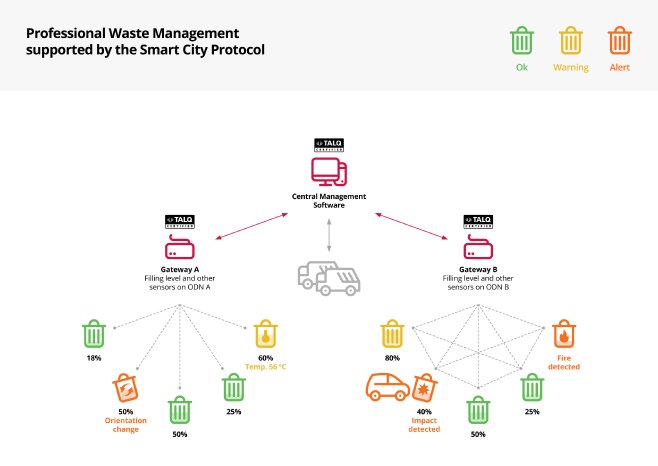To respond best to all new requirements of users and system manufacturers, the Smart City Protocol is regularly reviewed and updated. TALQ members and partners, such as cities and consultants, can propose new functions and other changes. All requests are reviewed by the Requirements Work Group before being passed on to the Technical Work Group for approval and integration.
With the newly released Version 2.3.0, completely new functions have been added in the form of a Waste Management profile, including a description of a waste container, a weight sensor, an accelerometer, a pH sensor and a gas sensor. This particular profile was requested by many members, demonstrating the momentum that has developed in the waste management sector in smart cities. Important savings can be realized, in both costs and CO2 emissions, as soon as waste collection is based on real data gathered live from waste containers. Additionally, in the latest version a few minor bugs have been fixed, and some descriptions have been clarified with the inclusion of several real examples.
More convenience for software developers
As a result of the API changes, new releases of the specification, data model files and TALQ Certification Tool (TCT) have been created. From now on, the technical capability to run the TCT with Docker is provided by the installation documentation file, thus allowing developers to use the tool without worrying about Java configuration and dependencies. Furthermore, the TCT now includes the possibility of running selected test cases only without waiting for the whole test session to finish, and pausing and resuming a test session have been made very much simpler: every software specialist can use the TCT in a much more comfortable and efficient way.
“As with all the existing functions already defined, the challenge is to describe new functions in a way which best balances interoperability, implementation complexity and feature value. To successfully manage this goal, the collaboration between members is fundamental. Releasing Version 2.3.0 proves again the engagement, trust and openness among all parties.” highlights Simon Dunkley, Secretary General, TALQ Consortium.
Version 2.3.0 is fully compatible with all existing certified TALQ-compliant products certified against Version 2.x


